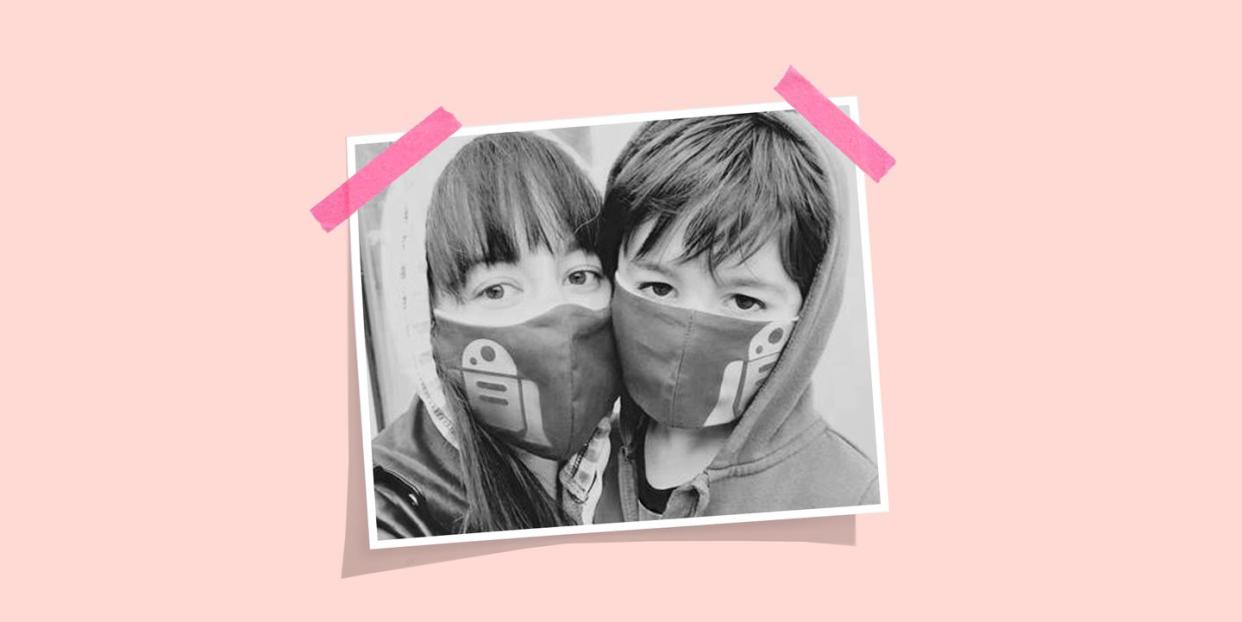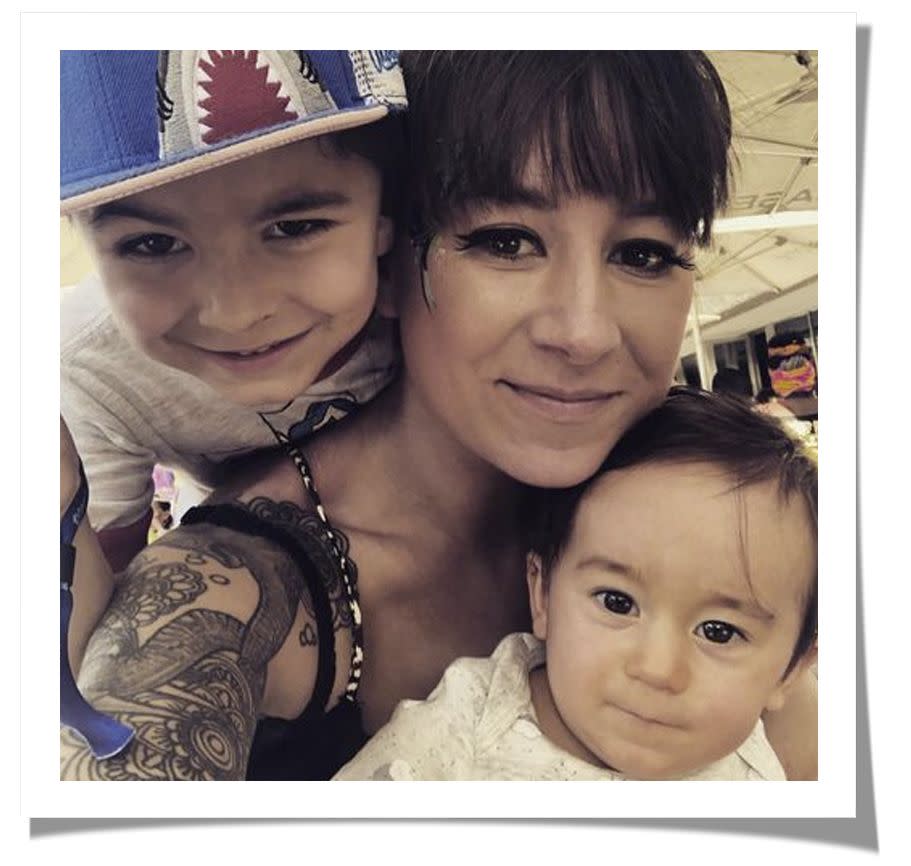Pandemic Parenting Has Turned Me Into the Kind of Mother I Don't Want to Be

I’m holding my 1-year-old as he screams in my ear while my 6-year-old wraps himself around my right leg. I’m craning my neck to hold my phone in place so I can remain semi-present during one of three conference calls scheduled for the day, while simultaneously fumbling through my cabinets to find something quick and probably processed to feed my feral children. I can feel my anxiety rise, my anger take hold and consume me. My patience has been whittled away to nothing more than a splinter, and before I can stop myself I scream at my 6-year-old to get off me.
Now my 6-year-old is crying. Now I’m crying, too.
After more than five months sheltering-in-place with my two children while working 80+ hours a week from home, I've come to realize I've morphed into the very worst version of my mom self. I'm now quick to anger, my patience is depleted and I'm too exhausted to care for my sons at the capacity they require. When I wasn't looking, my 1-year-old tripped and fell into our bookcase, splitting his head open and requiring a trip to the nearest emergency room. He left with six stitches. He's also busted his nose, bruised his forehead and had one nasty black eye.
I'm yelling more, I'm plopping my kids in front of screens for hours at a time, and more often than not I’m ending every day acutely aware of all I've managed to do wrong. Pandemic parenting is turning me into a bad mom, and as I look towards the fall and am hit with the realization that I will, once again, be tasked with facilitating my newly-minted first grader’s full-time at-home e-learning while caring for my 1-year-old, working and maintaining my home, I just don't know when I'll get the chance return to the mom I used to be.
Perhaps selfishly, I do find solace in the fact that I am not alone. Studies have shown that the on-going COVID-19 crisis is taking a toll on moms’ mental health, and during quarantine women are performing 15 more hours of domestic labor per week than their male spouses. Moms are more likely to cut their work hours during the pandemic to provide for their children than dads are, since moms are handling the majority of their children’s at-home education, too.
COVID-19 has exposed the impossible expectations all moms, and especially working moms, are told we must meet or exceed. And without access to systemic support that, let’s face it, was lacking prior to the onset of a global pandemic, moms like me are made to feel inferior. Lacking. Like failures. Like bad moms.
“This pandemic has led to increased parenting responsibilities coupled with more pressure to multitask by being forced to work and care for children simultaneously,” Cynthia Rogers, M.D., a child psychiatrist and Associate Professor of Psychiatry and Pediatrics at Washington University in St. Louis, tells me. “In that setting, parents are often forced to compromise by allowing more screen time than they would normally or loosening their usual rules about food choices, for instance. These often necessary changes from normal can lead moms to be overly self-critical as they judge their parenting by what they would have done prior to the pandemic.”

It’s difficult if not impossible for me to see the changes in my parenting as necessary compromises and not proof that I am wholly ill-equipped to be a working mother of two children. And given that working moms were shouldering the majority of the child-rearing and household responsibilities prior to the onset of a global pandemic, I have to admit that I have always felt like I was failing as a mother in some capacity. The fears I had when I was pregnant and worried about my ability to maintain my career; to maintain my other identities instead of being seen as “just mom”; to succeed in other areas of my life and be a loving, caring mother, have resurfaced many times in my six years as a mother. But they have become prevalent to the point of paralysis as the pandemic rages on.
Maybe I’ve always been a bad mom, I often think. Maybe this is who I really am.
In the rational parts of my brain, I know this is not true. I know that it’s common for parents, and especially moms who lack access to tangible support — be it affordable child care, paid family leave, breastfeeding and lactation support, equally involved parenting partners, and other resources — to feel like they’re failing. A 2018 study found that two-thirds of American parents feel like they’re failing their children. It’s as if the system is set up to make us feel like we’re failing … because it is.
Which is why Dr. Rogers encourages me, and moms like me, to be kinder to ourselves as we continue to navigate the effects of COVID-19. “Moms need to give themselves the same grace and understanding they would to a friend who told them they felt like they were a ‘bad mom,’” she says. “Ultimately, the quality of the parent-child interaction even if the quantity is a bit less than normal during these times, is the most important thing. Children need to feel loved and supported but they don’t need things to be perfect to thrive. I think sometimes as moms we forget that.”
I have never been a “perfect mom,” but I have never been a “bad mom,” either. Like any other human being, I have made mistakes. And like any other human being, including my two children, I have needs that must be met, especially in times of stress and duress. I do need time away from my family, just like I do need time away from my computer, my Zoom meetings; my seemingly never-ending conference calls. That while us moms can and often do find a way to do it all, we shouldn’t have to — especially when it comes to the detriment of our mental health and self-esteem.
“Moms should recognize that they are not superhuman and especially now with the pandemic to understand that it is okay to make needed compromises,” Dr. Rogers says. “It is important that moms also value their own well-being because that will enable them to be the best parent they can be.”
So in my worst moments, when my 1-year-old is screaming in my ear while my 6-year-old wraps himself around my right leg and I’m dialing into a meeting five minutes late as I make lunch, I am going to make a mindful, deliberate attempt to be kind to myself. To push myself to be better, yes, but to acknowledge that parenting in a pandemic was never in the plan, nor should it be. That like every other mom in America, I am doing my best, my best is good enough, and, most importantly, so am I.
You Might Also Like
